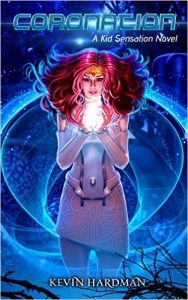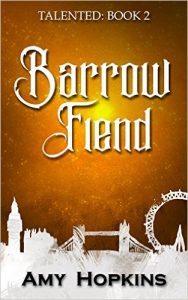Cora Buhlert's Blog, page 98
May 7, 2016
Photos: The Ems Barrier at Gandersum
Here is the second part of my photo post about my Ascension Day outing to East Frisia. Yesterday, we took a look at the town of Leer, today we visit the Ems Barrier at Gandersum a few kilometers downstream.
Gandersum is a tiny village on the River Ems, just a handful of houses and a medieval church, approximately 90 inhabitants all in all. And it’s very likely that no one would ever have heard of Gandersum, if it hadn’t been chosen as the location for the Ems Barrier in the 1990s.
As the name suggests, the Ems Barrier can shut off the river Ems, if necessary, keeping water in or out. The Ems Barrier was built between 1998 and 2002 and has a dual purpose.
The first purpose is flood protection, similar to the Thames Barrier in London (on which the design of the Ems Barrier is based) and the Deltawerken in the Netherlands. The idea is quite simple. In case of a massive storm surge in the North Sea, when winter storms press tidal waters into the river mouths, causing flooding and – in particularly bad cases like the 1953 and 1962 floods – heavy casualties inland, the river barriers are closed and keep the spring tides from flooding cities and farmland further upstream.
However, the Ems Barrier has another, more controversial purpose. For it cannot just be used to keep storm surges out, but also to keep the river waters in, causing the level of the Ems to rise. Now why would anybody want to raise the level of the river Ems? The answer lies 36 kilometers inland in the town of Papenburg, which also happens to be the location of the shipyard Meyer Werft, which specialises in building cruise liners.
Now anybody who has ever seen a modern cruise liner knows that those vessels are massive. And the river Ems is fairly shallow. And so, as the cruise liners built by the Meyer Werft became ever bigger, transferring those vessels the 36 kilometers down the river Ems to the North Sea became something of a problem. Because the last thing you want is a brand-new cruise liner getting stuck on the way to the sea. And this is where the Ems Barrier comes in. Because closing the Ems barrier raises the level of the river high enough to allow a cruise liner to pass through at high tide. As you can imagine, artificially damming up a river just to let giant cruise liner pass isn’t exactly good for the environment (and it is notable how muddy the Ems is compared to e.g. the Weser or the Elbe), which is why the Ems Barrier was controversial from the start. However, the Meyer Werft is the biggest employer and tax payer in the region, so their needs won out over environmental concerns.
A cruise liner transfer down the Ems is a sight to see BTW, because the giant vessels tower over everything in the area. It is also an enormous logistic undertaking, because first you have to wait for a suitably high tide, then Ems Barrier has to be closed to raise the level of the river even further and even then the vessel often only has centimetres to spare before running aground.
Here are some photos (not mine) of what a cruise liner transfer looks like: Here you can see a comparatively tiny tugboat towing a cruise liner along the river Ems, while people look on (cruise liner transfers are big tourist attractions), here we have the Star Virgo literally towering above farm houses, here we have the Aida Diva passing by overhead, while cars and trucks on the highway 31 drive into the Ems tunnel at Leer and here we have an aerial shot of a cruise liner passing through the Ems Barrier.
And now let’s see what it looks like from the ground and without a cruise liner:

A look at the Ems Barrier from the seaward side.

A look at the lifting gate from the seaward side. Here the gate is in raised position – it is lowered in order to damm up the river or in case of storm surges.

A side view of the lifting gate.

A view along the Ems Barrier on the inland side. The bollards mark the fairway.

A closer look at the main traffic gate of the Ems Barrier. The gate is 60 meters wide and equipped with a rolling gate similar to the ones used at the Thames Barrier.

The rolling main gate is operated via ballast water, which is stored in this basin, when the gate is closed.

A look down the river Ems. Note the sailboats and the wind turbines in the distance. The righthand shore is Germany, the lefthand shore is the Netherlands.

A look across the Ems at the village of Dirzum on the far side of the river. Note the church and the windmill.
For more about the village of Dirzum, go here.

Finally, here we have the famed East Frisian lawnmowers. Yes, those are sheep grazing on the dike next to the Ems Barrier.
Sheep may be found all over the North German coasts, grazing on dikes. The keep the grass on the dikes short and their hoofs compact the soil, which in turn strengthens the dike and helps it withstand floods and storm surges better.

A group of sheep on top of the dike at Gandersum.

More sheep at Gandersum. These sheep have an odd way of looking at you, as if they’ve seen it all before and weren’t impressed then either. It’s notable that they have been shorn recently, which is unusual, since sheep in North Germany normally aren’t shorn before mid May to early June.

This little guy is a real cutie and also surprisingly trusting. The adults are a lot more wary.

This photo wasn’t taken at Gandersum, but at the highway rest stop Apen Remels. I simply like the idea that the operators of the rest stop were considerate enough to offer a separate toilet for Daleks.
Okay, so I know that it’s just a shower sign, but it looks suspiciously like a Dalek.
 Send to Kindle
Send to Kindle
May 6, 2016
Photos: Leer in East Frisia
Yesterday was Ascension Day a.k.a. Father’s Day, which is a public holiday in Germany.
Ascension Day is traditionally a day for outings, including the infamous Father’s Day tours where groups of young men, most of whom are not fathers, set out with handcarts and/or bicycles to wander around the countryside and get very very drunk. I talk a bit more about this tradition in this 2013 post.
In addition to being a public holiday, yesterday also had some very sunny and pleasant weather and as a result, the streets were full of people of all ages and genders enjoying themselves on bicycles, motorbikes or on foot.
Because of the nice weather and the fact that it was a public holiday, we also decided to go on a trip to East Frisia. Our first destination was the city of Leer, a lovely little town located on a sidearm of the river Ems. Afterwards, we followed the river Ems and visited the Ems flood barrier at Gandersum.
Of course, I also took photos. We’ll start with the town of Leer and I’ll post the photos of the Ems flood barrier tomorrow.
Leer is quite an interesting town. It only became a city in 1823, but the settlement is more than a thousand years old, located in an area that has been inhabited since the stone age. Leer is not particularly big, it only has about 35000 inhabitants, but roughly twenty percent of the German merchant fleet have Leer as its port of registration.

A view across Leer city harbour, located on the river Leda, a side arm of the river Ems. This is not the actual seaport, but a harbour for pleasure boats.

This wooden statue of Neptune sits on top of a bollar in the harbour of Leer. It looks as if Neptune has an unfortunate accident and impaled himself on his own trident.

A view across the bow of a former harbour barge refurbished into a pleasure boat with a three-master in the background. Note the baby seals.

Another look along the harbour promenade (which is named after the CEO of a tea import company – more on that later).

A folding bridge with the bridge control house.

An old storehouse on the harbour promenade has been transformed into a cultural events space. It also has a garden with a cherry tree in full bloom.

A close-up look at some apple blossoms. Just because…

A vintage harbour tugboat built in 1924. This tugboat was in service until 1993, i.e. almost 70 years.

This historical building at the harbour of Leer once housed the town scales. Nowadays, it is an upscale restaurant called “Zur Waage und zur Börse” (The scales and the exchange). In front of the building, there is a traditional May pole

The striking Neorenaissance townhall of Leer, built in 1894.
More information about the townhall of Leer may be found here.

A neogothic townhouse and the tower of the Great Reformed Church in the background.

Another look at the tower of the Great Reformed Church. The tower was built in 1804, though the church itself is older. The interior is quite plain, because the reformed churches eschew ornamentation.
For obvious historical reasons, most German protestants are Lutherans, but we also have approximately 188000 members of reformed churches. Most of these are found in Northwest Germany. The reformed churches have been traditionally strong in Frisia, both in Dutch West Frisia and German East Frisia. The congregration in Leer is one of the biggest reformed churches in Germany.

A beautifully restored store and merchant house along the harbour promenade.

The striking baroque townhouse was built in 1643. Since 1800, it has been occupied by the wine merchant J.W. Wolff.
Leer also happens to be the tea capital of Germany and is home to the Bünting group, one of Germany’s biggest tea importers (they also own a few supermarket chains). For while most Germans prefer coffee, East Frisia is all about tea and has its own special tea blends, called Ostfriesentee, its own tea ceremony (described here and here) and even the tea china and cutlery (which is actually made in Bremen) to go with it.

This historical townhouse in the centre Leer houses the Bünting tea museum.

This statue of a young woman carrying a tea pot and offering a cup of tea is called Teelke, the tea girl. In the background, you can see the flagship store of the Bünting company. The actual Bünting tea factory and head office are located outside the city, but this townhouse was where it all started back in 1803.

A fountain depicting two playing children on the Ernst Reuter Platz, named after a former mayor of Berlin who spent his childhood and teen years in Leer.
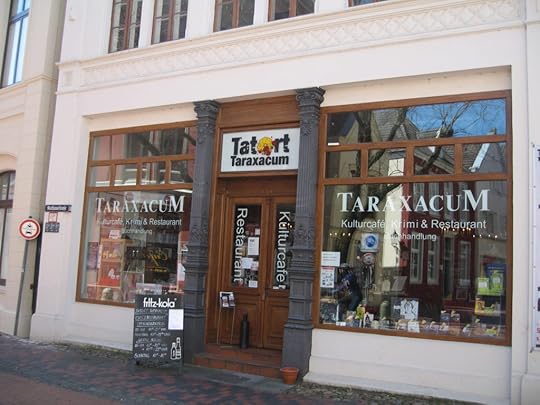
Tatort Taraxacum (Crime scene Taraxacum) is a crime and mystery bookshop/café/literary events space.
Here is the website of Tatort Taraxacum BTW, which seems to be a pretty awesome place. The building also houses the Leda-Verlag, a small press specialising in regional crime fiction as well as historical fiction set in East Frisia and the German coast in general. In general, I spotted quite a few independent bookstores in Leer, especially considering that the city isn’t all that big.

This early twentieth century townhouse is decorated with some very colourful murals.
We also had lunch in Leer. And since we were in East Frisia, we of course had fish. So here is my lunch:

My lunch: Rosefish filet with horseraddish cream sauce, duchess potatoes and salad.
 Send to Kindle
Send to Kindle
May 1, 2016
Yet more Hugo Debate 2016 – and a bit about the Clarke Awards
The 2016 Hugo debate is still going on, which isn’t surprising, since last year it lasted all the way until the winners were announced in August, whereupon it morphed into a debate of the winning works.
For my own contributions so far, see this post and this post.
Meanwhile, here are some more updates and reactions from around the web. Mike Glyer at File 770 has even more Hugo links, including several from puppy affiliated blogs and sites, which I won’t link to with “Do Not Link” down.
First of all, we have the second withdrawal, namely Black Gate, nominee in the best fanzine category and a good one, too, has withdrawn itself from consideration, because they don’t want the stink of puppy poo to stick to them. I certainly sympathise, though I’m also sad, because next to File 770, Black Gate was the other decent nominee in this category. George R.R. Martin weighs in on the Black Gate withdrawal and orders those nominees who were taken hostage by the rabid puppies not to withdraw.
So far, the good folks of MidAmeriCon have not yet released an updated ballot. I suspect they’re waiting if there are more withdrawals/disqualifications before publishing the updated ballot. After all, the Sasquan organisers last year had to update their ballot almost daily for a week or so.
Furthermore, we have a few general summaries of the whole affair courtesy of Scott Timberg at Slate and Tufayel Ahmed at Newsweek.
The puppies’, both rabid and sad, least favourite critic Damien Walter (they hate him so much that they have even attributed articles written by David Barnett and Adam Roberts to Damien Walter, since apparently reading a byline is beyond the ability of some puppies) weighs in on his blog. His suggestion for dealing with the rabid puppies match mine, namely figure out who they are and ban their arses.
Among other things, Damien Walter points out that it’s rather strange that H.P. Lovecraft was nominated in the best fanwriter category for the 1941 Retro Hugos, when he died in 1937. The nominations are probably for posthumous publications, though given that this is H.P. Lovecraft we’re talking about here, one cannot help but wonder whether certain eldritch forces were involved. Though personally, I suspect that the best fanwriter Retro Hugo nomination for Lovecraft may be the most notable sign of puppy impact on the Retro Hugos. Okay, there are also the many nominations for Robert A. Heinlein, but then Heinlein’s popularity extends way beyond the puppies and he was doing some damn good work in 1941.
Regarding the present day ballot, Damien Walter expresses his surprise that Kim Stanley Robinson’s novel Aurora is missing from the shortlist, but suspects that Neal Stephenson’s Seveneves and Robinson’s Aurora may well have split the vote of those who like their SF heavy on the infodumping. Since I feared I’d have to deal with both Seveneves and Aurora on the shortlist, neither of which is my thing at all, I’m glad that this is one bullet we managed to dodge.
In a follow-up post, Damien Walter also shares his theories regarding the identity of the most mysterious of this year’s Hugo nominees, namely Chuck Tingle, author of Space Raptor Butt Invasion, and comes to the conclusion that whoever Chuck Tingle may be, he is one hell of a savvy marketer.
Marian Crane not just starts off her Hugo post with a great pie-fight gif, she also finds herself amused by the Hugo nomination for Chuck Tingle. She also makes a good point, namely that if Vox Day felt that the obvious troll nomination of Space Raptor Butt Invasion would enrage those he calls “Social Justice Warriors”, CHORFs (nope, that was Brad Torgersen), puppy-kickers or whatever, he may well be in for a huge surprise. Because – hint – only prudes and puppies think “butt” is somehow a bad word and only homophobes are offended by gay erotica, particularly gay parody erotica.
ETA: I’ve seen a couple of people say at File 770 and other places that they don’t want to read Space Raptor Butt Invasion, which is of course their good right. I guess I had underestimated that many Americans in general and SFF folks in particular are weird about sex.
Meanwhile, N.K. Jemisin points out on Twitter (screenshot here) that even though Chuck Tingle seems to be a pretty cool person, his (I’m going by stated gender here, even though Chuck Tingle is clearly a pen name) nomination still keeps deserving nominees off the ballot, many of which may be women, writers of colour, LGBT writers or international writers. And it’s pretty obvious that for Vox Day, gaming the Hugos is as much about keeping people and works he dislikes out than getting his choices in.
Meanwhile, Cuck Tingle himself responds to both the Rabid Puppies and those who criticise his nomination by publishing a sequel to his Hugo nominated story Space Raptor Butt Invasion, a sequel entitled Space Raptor Butt Redemption. If Vox Day pushed Chuck Tingle onto the ballot merely to troll us all, he may be in for a rude awakening, because so far Chuck Tingle us outtrolling Vox. Conceptual Neighbourhood also points out that Vox Day’s attempts to weaponise Chuck Tingle and his work backfired badly.
Though it’s not just Vox Chuck Tingle is trolling, it’s everybody. For example, at File 770 Mike Glyer posts a series of Tweets by Chuck Tingle, which seem to be his answer to requests to withdraw.
Nonetheless, I like Chuck Tingle and his way of dealing with this whole mess. And we’ve certainly had not quite serious Hugo nominees before like John Scalzi’s April Fools story “Shadow War of the Night Dragon”. Though I still feel sorry for whichever legitimate nominee was kept off the ballot by Space Raptor Butt Invasion.
But enough about Chuck Tingle who seems to unduly dominate the Hugo discussion this year (apparently using “butt” in the title of a short story is still newsworthy in the US) and on to other nominee reactions. Spacefaring Extradimensional Happy Kittens has done us all a favour and compiled links to the reactions of nominees who found themselves on the Rabid Puppies slate, often against their will.
The people behind the horror podcast Tales to Terrify were horrified to find themselves on the Rabid Puppies slate. They’re connected to StarShipSofa, a previous winner in the best fancast category, and seem to be yet more of Vox Day’s human shields.
Alastair Reynolds, whose novella Slow Bullets had the highly dubious honour of being on being on both the Sad and the Rabid Puppy list, points out that he wants nothing to do with puppies of either stripe and that his request to be removed from both puppy lists were ignored. Slow Bullets was getting buzz way before either puppy list appeared, so Alastair Reynolds may well be one of those nominees who would have made it without canine help.
Campbell nominee Alyssa Wong who squeaked just onto the Sad Puppies list, very likely due to people who were recommending decidedly unpuppyish works and authors to check the honesty of this year’s Sad Puppy organisers (Good news: They were honest. Bad news: You may well have made some good authors doubt themselves), explains that she’s not withdrawing, since Vox Day’s objective was specifically to keep people like her off the ballot.
At KBoards, David VanDyke, whose novelette “What Price Humanity?” was on the Rabid Puppies slate, distances himself from all political genre infighting and states that he only submitted to the There Will Be War anthology (published by Castalia House) because he wanted to work with Jerry Pournelle.
S.R. Algernon, author of the Hugo nominated short story “Asymmetrical Warfare”, which was on the Rabid Puppy slate, weighs in at Goodreads and basically says that they (I couldn’t find out which gender S.R. Algernon is, so I’m going with “they” for now) wants nothing to do with the politics of the whole Hugo debate. He also offers links to other stories they’ve written in a follow-up post to allow people to better evaluate their work.
John Picacio, winner of the best pro artist Hugo in 2013, weighs in on the subject of the 2016 best pro artist ballot and puts in a good word for Larry Elmore. In the comments, someone also gives information on the other nominees in this category and their backgrounds, if – like me – you have no idea who these people even are.
For the statistics geeks, Brandon Kempner of Chaos Horizon and Greg Hullender of Rocket Stack Rank both offer an analysis of the 2016 Hugo nominations and also try to estimate the size of the Rabid Puppy voting bloc. According to those estimates, Vox Day’s Dead Elk (not my term, alas, someone at File 770 came up with that one) number somewhere between 220 and 300. And considering we had almost 4000 nominators in the biggest categories (which coincidentally show the least puppy influence), it’s damn depressing that five to seven percent of nominators with malicious intentions can flood the ballot with their choices.
So what do we do now and where do we go from here? The G. asks these very questions at nerds of a feather. He (I happen to know The G and that he’s male) also states that he won’t back any counterslates, regardless of political background (neither will I, since very few people share my tastes anyway). He also wonders whether to disengage completely and defect to the Locus Awards.
Now I like the Locus Awards, find them valuable and normally participate, unless I forget. The winners picked are also usually good. However, the Locus Awards don’t have fan categories, unlike the Hugos. I also don’t particularly care for the fact that they pre-seed the ballot with their recommended reading list, which often does not reflect my taste. And yes, I know you can write in candidates, but how many write-ins have a chance. Plus, as Natalie Luhrs points out in her analysis of the Locus Recommended Reading list, the list is biased in favour of male writers and white writers. So I prefer the open nomination system of the Hugos. Plus, Vox Day has announced that he is planning to manipulate the Locus Awards (and the new Dragon Awards) as well.
At his livejournal, Kevin Standalee proposes a change to the Hugo voting process he calls three-stage voting, which inserts an intermediary semifinals/longlist round between the initial nominations and the final ballot. He also goes a bit deeper into the idea in this follow-up post.
Conceptual Neighbourhood has a post regarding what to do about the Hugos now with a follow-up post here, in which they evaluate various proposals in how to deal with the puppy mess.
At ComicMix, Glenn Hauman weighs in in favour of blanket voting everything on any slate under “No Award”, since Neil Gaiman, Stephen King or Lois McMaster Bujold don’t need a pity Hugo. He’s right that none of these nominees need a pity Hugo, but I still don’t see why I should punish writers and works I like and often nominated myself for something that Vox Day did.
Ben Peek makes a similar point and also advocates for voting everything on any slate under “No Award”. He also urges nominees who were on a slate to withdraw. I find this hugely problematic, especially considering that both Vox Day and the Sad Puppies refused to take people off their respective slates/lists on request and got real pissy about it, too. Never mind that unwilling slate nominees withdrawing may well mean that we lose the few decent nominees on the ballot, since it’s pretty obvious that the people behind trash like “If You Were an Award, My Love”, “SJWs always lie” or “Safe Space as a Rape Room” won’t withdraw.
At Amazing Stories, Steve Davidson also champions blanket no awarding everything that was on a slate except for those slated nominees who stated that they were opposed to slates and wanted to be removed. He also urgens voters to vote their conscience.
At Alas, a Blog!, cartoonist Ampersand proposes a strategy that more closely matches my own, namely no award the bad nominees which would not have made the ballot with canine help and judge everything else on merit.
Joe Follansbee declares the Hugos dead altogether after two years (three if you include Larry Correia’s second Sad Puppy campaign in 2014, which also messed up the ballot, though not as badly as in 2015 and 2016) of puppy shenangigans.
At The Booksmugglers, Thea James and Ana Grilo beg to disagree that the Hugos are dead and urge everybody who cares about the award to participate and vote this year. I just bought my supporting membership for MidAmeriCon II BTW, so what are you waiting for?
Jim C. Hines shares a few Hugo requests, namely that nobody should tell anybody else how to vote (which I completely agree with), that people shouldn’t behave abusively towards the nominees and that there should be no asterisks, because the puppies were apparently really offended by the wooden asterisks handed out before the ceremony and sold for charity last year.
As I said, I agree wholly with not telling anybody how to vote and with not heaping the nominees with abuse. But while I did see some comments that crossed the line on the non-puppy side and some innocents got caught in the crossfire, the vast majority of abuse last year and the one before came from the puppy side, both sad and rabid. Because a lot of the most outspoken puppies (which does not mean the puppy nominees, but the spokespuppies) seem to be incapable of getting even through a single post on the without getting nasty. I’ve been the target of their abuse, as have been many of my friends. Meanwhile, the noisiest puppies also seem to be the most thin-skinned people alive, who take offence at even the mildest of criticisms. For people who always complain about trigger warnings and the like, the prominent puppies are sure easily triggered.
Which brings me to the asterisks. Now I’ve never really understood why the asterisks were so controversial and why some puppies felt so offended by them (apart from the fact that some of them get offended by someone who looks at them the wrong way). I merely see asterisks as a footnote indicator (and there will be an asterisk and a footnote behind the 2015 and 2016 Hugo shortlists), but apparently to Americans, asterisks behind sports results mean that someone cheated, whereas in Europe an asterisk behind a sports result merely means “Check out the footnote”, which could say anything from “This match had to be broken off because of heavy rain/snowfall/the stadion floodlights failing” to “Someone cheated”.
Apparently, some puppies also feel that the wooden asterisks look like arseholes (I believe they call them CHORFholes), which again makes me wonder about their mental age and maturity, because I know no one over the age of 12 who checks out what their own butthole looks like with a mirror. What is more, given the asterisk = arsehole comparison and insistence on the part of some noisy puppies that Space Raptor Butt Invasion is the revenge for the asterisks, some of them do seem to have a bad case of anal fixation.
David Gerrold, last year’s Woldcon GoH and Hugo ceremony toastmaster and the person who commissioned the wooden asterisks, replies to Jim C. Hines that no offense was intended and that given how thin-skinned some puppies are, they would always have found something to take offence at. He also points out that the asterisks raised 2800 USD for a charity that runs an orangutan in Borneo.
Laura Tegan Gjovaag defends David Gerrold and the asterisks by pointing out that it was the puppy organisers put the asterisks behind the 2015 Hugos and that she can’t feel sorry for those who felt offended. I feel inclined to agree with her – never mind that I don’t see just why the puppy leaders are so furious about the asterisks anyway.
While on the subject of puppies, Dara Korra’ti had the misfortune of getting into a Twitter discussion with one of them who calls himself Marc DuQuesne after the villain in E.E. Smith’s Skylark novels (though Marc DuQuesne and “hero” Richard Seaton later team up to commit genocide together) and reports about the experience on her blog. “Blackie DuQuesne” repeats basic puppy talking points, the puppies only reacted to “secret slates”, since absolutely no one could possibly have enjoyed the works that the puppies dislike. It’s all stuff we’ve heard a thousand times before from the puppy camp and it’s still as clueless as it always was.
Dara Korra’ti also points out the new puppy/rightwing jerk in general buzz phrase “virtue signalling”, which basically claims that people who express views that don’t match those of rightwing jerks don’t actually hold those views, they just express them publicly to show that they are good people. Just like absolutely no one could have honestly liked Ancillary Justice or “If you were a dinosaur, my love” or “The Water That Falls On You From Nowhere” or whichever Hugo nominee/winner the puppies hate this week. The phrase “virtue signalling” originates with British journalist James Bartholomew who is actually proud of coining it, which should tell you all you need to know about him.
At Bibliodaze, Ceilidh points out that the puppies’ tactics are deliberately aimed at excluding people they don’t like both from the Hugos and the genre. And this goes for both the sad and rabid puppies, since prominent members of both are on record that they don’t want works that don’t match their very narrow definition of the SFF in the genre. Just take a look at Brad Torgersen’s now infamous “Nutty Nuggets” post (I don’t really have to link to that again, do I? Just google it).
However, Ceilidh also points out that women, LGBT writers and writers of colour have always been part of the genre, from the very beginning on (quite literally, since Mary Shelley and Margaret Cavendish, two of the earliest SFF writers, were women).
On the other hand, Charles Payseur points out at Quick Sip Reviews that puppies and other reactionaries have always been part of the genre as well and that the puppies are but the symptom of a larger problem, namely that there are a lot of people who resent change and idolize a monocultural past that never existed. And now that those people feel under siege, because things are finally getting a little bit better, they strike back.
We are currently seeing a variation on the same phenomenon here in Germany. The conservative CDU under Angela Merkel has finally morphed into a party that takes the the Christian bit in its name (CDU stands for Christian Democratic Union) seriously and welcomes refugees fleeing various civil wars and undemocratic systems in the Middle East and Africa (it’s not just Syria, but also Iran, Iraq, Afghanistan, Eritrea, Somalia, Mali, etc…) and coincidentally has also finally become a party I can imagine myself voting for and promptly we get a backlash from disgruntled and envy-driven petit bourgeois jerks in the form of the AfD and Pegida who can’t handle the fact that their Germany (which was never a place I identified with in the first place) is changing. And once again, these people were always there, they have merely become a lot bolder instead of keeping their hateful views to themselves. Personally, I also think we’ve been too tolerant towards these hateful people for too long – there is a reason I wrote Christmas Eve at the Purple Owl Café, because the person who was disinvited from an event (though it was a New Year’s Day rather than a Christmas party) for refusing to tolerate the presence of a horrible racist, that was me.
Charles Payseur also links to the crowdfunding campaign of Rosarium Publishing, a company which specialises in SFF by diverse authors. I already linked to the campaign over at the Speculative Fiction Showcase, where that sort of thing usually goes, but since it’s a really worthy project, here is the link again.
At The Hysterical Hamster, Ian Mond shares his thoughts about the Hugo and Clarke Award shortlist and points out that one is much better than the other. We largely agree on the Hugo nominated novels, though I like Jim Butcher better than he does. As for the Clarke Award, Ian Mond doesn’t much care for The Long Way to a Small, Angry Planet by Becky Chambers, which I enjoyed a whole lot, but loves Europe at Midnight by Dave Hutchinson, which I don’t care for.
While we’re on the subject of the Arthur C. Clarke Awards, which celebrate their 30th anniversary this year, at The Guardian Clarke Award director Tom Hunter looks back on thirty years of Clarke Awards and wonders what the future holds for the award.
Meanwhile, Nina Allen also compares the Clarke Awards positively to the Hugos and not just because they have the better shortlist, but also because the fact that the Clarke Awards are juried makes gaming and log-rolling attempts like what the puppies did in 2015 and 2016 impossible. She also believes that the fan awards like the Hugos don’t generate as much critical discussion. But then, the Clarke Awards don’t normally generate a whole lot of critical discussion outside the jury either – except that one year when Christopher Priest decided to insult the entire shortlist, including calling Charles Stross a yapping internet puppy before “puppy” was a serious insult in SFF circles, and promptly caused a massive genre uproar.
Nina Allen goes on to discuss the perception that the Clarke Award tends to reward for literary than core genre works (not true) as well as its record with regard to diversity of the nominees. It’s a really great post in general, so just go over there and read it.
Comments are still closed, puppies whine elsewhere.
 Send to Kindle
Send to Kindle
April 29, 2016
Indie Speculative Fiction of the Month for April 2016
 It’s that time of the month again, time for “Indie Speculative Fiction of the Month”.
It’s that time of the month again, time for “Indie Speculative Fiction of the Month”.
So what is “Indie Speculative Fiction of the Month”? It’s a round-up of speculative fiction by indie authors newly published this month, though some March books I missed the last time around snuck in as well. The books are arranged in alphabetical order by author. So far, most links only go to Amazon.com, though I may add other retailers for future editions.
Once again, we have new releases covering the whole broad spectrum of speculative fiction. We have retro science fiction, space opera, paranormal romance, epic fantasy, urban fantasy, horror, post-apocalyptic fiction, weird western, vampires, werewolves, wizards, demons, witches, time travel, zombies, alien invasions, flying saucers, god killers, superheroes, exiled princes, Wild West mages and much more.
Don’t forget that Indie Speculative Fiction of the Month is also crossposted to the Speculative Fiction Showcase, a group blog run by Jessica Rydill and myself, which features new release spotlights, guest posts, interviews and link round-ups regarding all things speculative fiction several times per week.
As always, I know the authors at least vaguely, but I haven’t read all of the books, so Caveat emptor.
And now on to the books without further ado:
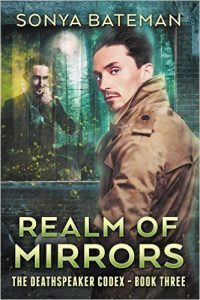 Realm of Mirrors by Sonya Bateman:
Realm of Mirrors by Sonya Bateman:
“The dead must answer to you, and no one else. Remember that, Gideon.”
He may be the DeathSpeaker, but Gideon Black has no idea what he’s doing. The job didn’t come with an instruction manual. That’s why his half-brother Taeral plans to bring him across the Veil to the Fae realm of Arcadia, to consult with an ancient Fae who knew the previous DeathSpeaker personally.
Those plans are violently interrupted when the royal Unseelie Guard invade their home, dragging Taeral and their father, Daoin, to Arcadia ahead of schedule. And Gideon will do anything to get them back.
But the concrete jungles of Manhattan are nothing compared to the threats waiting in Arcadia. Facing deadly wildlife, even deadlier enemies, and magic he never imagined possible, Gideon must learn quickly to wield his power as both a Fae and the DeathSpeaker — before the vengeful Unseelie Queen can exact a cost higher than death from his family, and everyone he holds dear.
 Double Feature by Cora Buhlert:
Double Feature by Cora Buhlert:
1956: Judy is the designated town slut of Stillwater Creek. After getting thrown out of a sock hop at the local high school, Judy winds up going to the movies with bad boy Hank instead, where a science fiction double feature is playing. However, before the first reel of the second movie is through, the night is interrupted by a very real invasion of flying saucers from outer space…
This is a novelette of 8500 words or approx. 30 print pages.
 The Young Vampire’s Survival Guide by Lucy Eldritch:
The Young Vampire’s Survival Guide by Lucy Eldritch:
It started with his death.
Student Robert James never asked to be bitten. He didn’t want to be the leader of a new breed of vampires. Thing is: he wasn’t offered a choice.
Survival and destiny combine when Robert finds himself under threat from a mysterious cult known as the Dawn Warriors. Within months, many of those he cares about are dead and he vows to fight back without mercy. Robert unearths terrible truths and confronts eternal evils that threaten to break him. He may not succeed in defeating the Dawn Warriors, but he has no choice but to try.
‘The Young Vampire’s Survival Guide’ is the first book in the ‘New Breed Vampires’ book series. Described as “Anne Rice meets Kelley Armstrong”, it is set in London and Manchester and written in British English. It’s gruesome, compelling, horrifying and uplifting vampire fiction.
 In the Dark: A Novella of the Undying by Kera Emory:
In the Dark: A Novella of the Undying by Kera Emory:
Chase Covington and Anne Sheffield are on the run, but Chase isn’t sure where they’re going.
She’s a centuries-old vampire, and he’s been a werewolf hybrid for about three weeks. They’ve left a trail of bodies and a shattered supernatural treaty in their wake, and they’re having major communication problems.
And when the full moon rises, things are going to get a whole lot worse.
From the author of YOUR NAME, IN FIRE, this stand-alone novella pays homage to classic Urban Fantasy traditions.
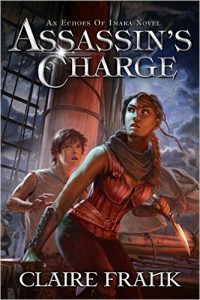 Assassin’s Charge by Claire Frank:
Assassin’s Charge by Claire Frank:
A cold-hearted assassin. A boy with a price on his head.
Rhisia Sen is one of the Empire’s highest paid assassins. Living a life of luxury, she chooses her contracts carefully, working to amass enough wealth so she can leave her bloody trade. She is offered a new contract on the outskirts of civilization, and almost refuses—until she sees the purse. It could be the last job she ever has to take.
But when she reaches the destination, she discovers her mark is a child.
The contract, and her reputation, demand she kill the boy—if she can banish his innocent face from her mind. But another assassin has been sent to kill her, and a notorious bounty hunter is on her trail. She doesn’t know why the boy is a target, or why her former employer wants her dead. Saving the child could be her only chance at survival.
Assassin’s Charge is a stand-alone novel, set in the same world as the Echoes of Imara series. It can be enjoyed with or without having read the other books in the series.
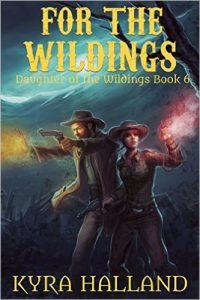 For the Wildings by Kyra Halland:
For the Wildings by Kyra Halland:
In the conclusion of Daughter of the Wildings, Silas and Lainie recover from their ordeal in Granadaia, while knowing that an evil is at work that threatens the freedom of the Wildings and that this peaceful interval is no more than a brief illusion. Then the unthinkable happens, the battle begins, and Lainie, the daughter of the Wildings, and Silas, the man she has claimed for herself and for the land, have to draw on all their power and strength – and on the life of the land itself – to protect their beloved Wildings and the people who make it their home.
As the grandson of the alien princess Indigo, Jim (aka Kid Sensation) has always known that, technically, he’s royalty. That said, he’d be the first to admit that he’s never lived any kind of regal lifestyle – no titles, no castles, no crown jewels… However, the arrival of a courier from his grandmother’s homeworld changes all of that in an instant.
By royal edict, Jim is summoned “home” to the distant planet Caeles in order to claim an alien inheritance. Unfortunately, this is no warm and cuddly family reunion. Caeles is a hotbed of political intrigue, and Jim’s arrival has widespread ramifications. Not only are several factions attempting to utilize his very existence as leverage to advance their own agendas, but Jim himself is required to submit to an archaic trial known as a prexetus. Moreover, while some are content with simply trying to use him, it quickly becomes apparent that at least one shadowy individual just wants Jim out of the way – quickly, completely, and permanently.
Light years from Earth, with little family and fewer friends, Jim faces the daunting task of finding an enemy whose ultimate purpose is unknown and whose methods are extreme. Complicating matters even further is the fact that Jim’s much-heralded super powers are glitching, making him incredibly vulnerable for perhaps the first time in his life.
 Let Go by Michael Patrick Hicks:
Let Go by Michael Patrick Hicks:
Widowed and with retirement drawing near, Everett Hart believes he has already lost everything – until the dead begin to rise.
Trapped in a cheap restaurant with a small band of other elderly survivors, Everett is forced to decide if he’ll fight for whatever scraps of a future remain, or if he will simply… let go.
LET GO is a short story of approximately 10,000 words.
When Emma is approached by DCI Greyson to assist with a case, her first instinct is to say no. Still shaken by the attack on her life six months earlier, and balancing her friendships with a budding relationship, she’d prefer to stay clear of the danger.
However, circumstances force her hand and she throws herself into the investigation. She soon realises that her target isn’t a mysterious creature, but a dangerous man without the slightest care for human life…
Can Emma survive the biggest risk she’s ever faced, or will she have to sacrifice too much?
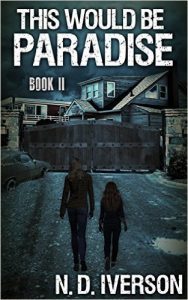 This Would Be Paradise, Book 2 by N.D. Iverson:
This Would Be Paradise, Book 2 by N.D. Iverson:
Community connotes safety and togetherness–or does it?
Bailey and Chloe head back on the road, where they come across strange markings belonging to a group intent on bloodshed and abduction. With this heinous enemy lurking in the shadows, they seek help in new and old friends along the way.
When they arrive at Hargrove, nothing is what it seems inside the makeshift, post-apocalyptic community. People are turning up dead, and for once, zombies aren’t the ones to blame. Fingers are pointed, everyone is a suspect, and no one is safe outside or inside these walls.
Page count: ~282 pages
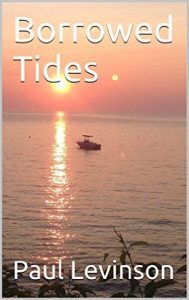 Borrowed Tides by Paul Levinson:
Borrowed Tides by Paul Levinson:
The first starship to Alpha Centauri in 2029 uses a new technology which can move it through deep space at almost half the speed of light. But it requires an enormous amount of fuel, and can only carry enough for a one-way trip. A philosopher of science and his childhood friend, an anthropologist with a specialty in Native American culture, have a daringly bizarre plan, and talk the government into putting them in charge of the Light Through starship voyage.
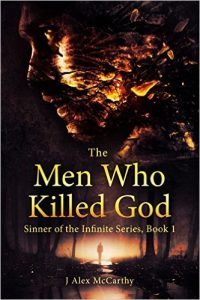 The Men Who Killed God by J. Alex McCarthy:
The Men Who Killed God by J. Alex McCarthy:
This is it.
They have finally done it.
They have finally killed a god.
In August’s world, everything was created by a single, secular god. HE—the creator of everything. However, HE left the world to be ruled with a subtle, iron fist by less powerful gods.
It had been two years since August stepped foot into his hometown, Sotira. It had also been that long since he’d last visited his father, seen his crooked smile, and felt those familial ties.
He wished he didn’t have to return. However, at the request of his girlfriend and his family, he was heading back home. To a place where the foundations themselves were built with false truths, hidden behind the ‘utopia’ the gods supposedly created. He knew fear lay under all that outward, deceitful happiness—a terror that Sotira would be next to come under the wrath of the gods.
When August arrived home, he wasn’t prepared for what he found. His best friend had been hanged and turned into a monument in the middle of town by the order of his father and the gods. The world he thought he knew had been turned upside down. To turn it right again, August would do anything… even start down the path that would allow him to gain the power to kill God.
 Doctor Wolf by Jenny Schwartz:
Doctor Wolf by Jenny Schwartz:
A werewolf in London romance.
Liz Jekyll might be the most wanted werewolf in London—wanted for dating, that is—but she doesn’t take it as a compliment. In fact, it’s a wretched nuisance because Liz has a vital secret to hide. What she needs is a disinterested werewolf who could pretend to be her boyfriend.
Carson Erving would be very interested in Liz if it weren’t for Gentiana Aeternae. The botanist werewolf from Alabama has found the legendary Elixir Gentian, and ruthless people will do anything, kill anyone, to get their hands on a plant that can grant an extra hundred years of life.
As danger explodes around them, two very independent werewolves will have to do the unthinkable and rely on one another. But when Liz’s secret is revealed, who will die?
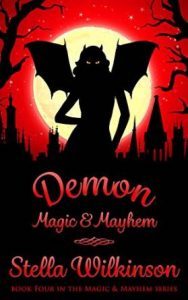 Demon Magic & Mayhem by Stella Wilkinson:
Demon Magic & Mayhem by Stella Wilkinson:
You know that feeling when you think life is pretty darn perfect, and then a werewolf savages your best friend and a ridiculously sexy demon drags your boyfriend off to hell with her? No? Just me then…
Young witch Emily Rand is back doing what she does best – blundering her way through paranormal mishaps with limited magic and mixed luck. But with her crow on her shoulder, and a ghost by her side, Emily’s not about to let some demonic vixen kidnap and keep the hot werewolf that holds her heart.
This book also includes a bonus short story : All Hallows Eve
 Send to Kindle
Send to Kindle
April 27, 2016
2016 Hugo Shortlist: More Thoughts and Reactions – and the Clarke Awards
There have been a few developments since my last Hugo shortlist reaction post.
Warning: Lots of links and neepery behind the cut:
For starters, File 770 is back. What caused it to go down was not puppy shenangigans (cause you can never be sure) via DOS attacks nor excessive traffic due to the Hugo announcement, since File 770 is the only place where you can view the Rabid Puppy list without visiting Vox Day’s site. There is currently a lot of good discussion going on over there – this direct comparison of the Rabid Puppies slate and Sad Puppies list seems to be the most active post. There is also a reactions round-up at this File 770 post. Moreover, there is a good discussion going on at Metafilter here.
Meanwhile, at The Guardian, David Barnett offers a recap of the puppy saga so far with quotes by George R.R. Martin, Vox Day and unwilling puppy shield Alastair Reynolds in an article that went live before the shortlist was announced. David Barnett also reports about the actual shortlist.
At Electric Lit, Chelsea Baumgarten also offers a summary of the whole mess, as does Katharine Trendacosta at io9, while at the Los Angeles Times, Michael Schaub also offers an explanation of the puppy drama, focussing on everybody’s favourite absurd nominee, Chuck Tingle and his Space Raptor Butt Invasion.
Abigail Nussbaum, who would have been a most deserving best fanwriter nominee, seems to agree with me that this year’s puppy infested ballot is bad, but not nearly as bad as it could have been and better than last year’s.
I already linked to Aaron Pound’s reaction in an ETA yesterday, but here is is again, just an case you missed it. He’s also pretty angry.
At Nerds of a Feather (one of my fanzine nominees, which didn’t make it), Joe Sherry declares that he’s not angry, just disappointed, and that he still loves the Hugos.
At Conceptual Neighbourhood, Katster breaks down their reaction in a multi-part post, of which part 1 and part 2 are already up.
Let’s get to the reactions by the finalists, particularly those who ended up in the Rabid Puppy slate without their consent or knowledge. Lois McMaster Bujold points out that her novella Penric’s Demon was conscripted onto the puppy slate against her will and that her requests for removal were ignored.
Grey Carter, artist of the Erin Dies Alone webcomic (which, at least for me, was one of the “What the hell is this?” nominees) is considerably less than happy about being co-opted by Vox Day for his culture war.
The fanbase of the My Little Pony: Friendship is Magic cartoon are also less than pleased about being co-opted by the Rabid Puppies for whatever reason (since it’s not actually clear whether My Little Pony: Friendship is Magic was intended to be a troll nomination a la Space Raptor Butt Invasion, whether Vox Dax is trying to drag the bronies into his culture war or whether he genuinely likes the show, because he detected a rightwing message inside a children’s cartoon about the magic of friendship). At FIM Fiction, horizon offers a pretty good summary of the background of the entire puppy mess and also offers some suggestions regarding what to do. At the furry site Flayrah, a My Little Pony fan named Brendan Kachel also offers a summary of the puppy drama.
Chuck Tingle, author of Space Raptor Butt Invasion and similar classics like Gay T-Rex Law Firm, shares his reactions to his nomination in an interview with Lauren Sarner at Inverse. Meanwhile, Mr. Tingle’s latest masterpiece Slammed in the Butt By My Hugo Award Nomination has already spawned a parody entitled Pounded in the Butt by Chuck Tingle’s Hugo by Tuck Chingle. I already said yesterday that I don’t think Chuck Tingle and his Space Raptor Butt Invasion are the worst thing ever on the Hugo ballot and in fact, I find myself quite liking him. Though I still feel sorry for whichever legitimate nominee was knocked off the ballot by Space Raptor Butt Invasion.
I already posted in my last post that we had the first withdrawal after barely twelve hours, since Thomas A. Mays has withdrawn his short story “The Commuter” from consideration. Kudos to Thomas A. Mays for what cannot have been an easy decision. Let’s hope the replacement is something a bit less puppyish.
Brandon Sanderson, whose novella Perfect State was also on the Rabid Puppy list, weighs in and explains his decision not to withdraw, though he had been asked not to be put on any puppy slates last year. Now Brandon Sanderson seems to be a good guy, though his fiction doesn’t do much for me, and given his popularity, he’s one of the nominees who might well have ended up on the ballot anyway. And I understand his decision not to withdraw.
However, I disagree with one point, namely that the Sad Puppies were treated badly by fandom and the media last year. Now I understand that some of the Sad Puppies are his friends and I’ve also stated before that the Sad Puppies have improved this year by offering a recommendation list and including even recommendations for the sort of works they dislike, which is how e.g. Ann Leckie ended up on the Sad Puppy list. However, the Sad Puppies were not treated unfairly by fandom and the media last year, because let’s not forget that it was Larry Correia who started all this, because he was butthurt about losing the Campbell Award to Lev Grossman, and who brought in Vox Day in the first place. And Brad Torgersen amped up the hostile rhetoric in 2015 and not just denied everything that did not meet his personal definition of science fiction a place in the genre, he also engaged in all sorts of hyperbole and namecalling. And I don’t think that negative media articles, wooden asterisks which really offend puppies for some reason, and people applauding “No Award” was treating them unfairly, though I felt sorry for the few decent nominees on their slate. Besides, it’s rather obvious by now that the Sad Puppies aren’t the real problem here, but the Rabid Puppies.
George R.R. Martin weighs in on the Puppy debate as well, points out that the Rabid rather than the Sad Puppies are the problem and urges those finalists who were co-opted against their will and may well have been nominated anyway not to withdraw. Oh yes, and George R.R. Martin also announces that he will continue the Alfie Awards this year.
At the Los Angeles Times, John Scalzi also points out that a people like Lois McMaster Bujold, Andy Weir, Stephen King and Neil Gaiman may very well have been nominated anyway and that Hugo voters should trust their own taste and vote accordingly. At his own blog, Scalzi also adds that he doesn’t really want to get all worked about the puppies, even though he is a direct target of two of the more noxious finalists. Which made me think, “Well, that’s nice for you, but probably not an option for everybody.” Because let’s not forget that as a straight white man, Scalzi is something of an oddity among the puppy targets, since most of those they attack and harrass are women, POC or LGBT people.
And make no mistake, what Vox Day and his Rabid Puppies (as well as the nastier of the Sad Puppies) are doing is harrassment, as pointed out in the wonderful Fangirl Happy Hour podcast by Ana Grilo and Renay Williams, which was on my nomination list this year, in their special Hugo shortlist reaction edition by very angry Renay and a rather numb Ana.
Renay and Ana also point out that many of the slots on the Hugo ballot that were taken over by Puppy nominees, particularly in the fan categories, but also in the art and short fiction categories as well as the Campbell Award might well have gone to women, LGBT people and people of colour otherwise. And yes, I know that the puppies, both sad and rabid, have their women and POC shields, Toni Weisskopf being the most obvious one. However, the puppies, both sad and rabid, are also on record that they want to erase works which they dislike – often works by women, POC and LGBT writers, which privilege emotions, characterisation and the experiences of women – from the genre altogther. They don’t just want us not to win awards, they want us gone. And that’s pretty much the definition of erasure.
Though I disagree with them about Avengers: Age of Ultron, which I enjoyed quite a bit and which was also on my ballot.
Chuck Wendig agrees with Renay and Ana and points out that pop culture has a problem with toxic men and that the Rabid Puppies are but one facet of that problem. He also explains that he hopes that the toxic men which have infected many sectors of popular culture are largely a reaction to that fact that things are changing for the better, albeit slowly.
Of course, the question is what to do now and how to react.
Philip Sandifer points out that we must fight the puppies with every tool we have and pegs his hopes on the “E Pluribus Hugo” amendment. He also points out that the Retro Hugo ballot is really good this year, though sadly he can’t resist making an anti-German crack, while he’s at it. Honestly, people of whatever political stripe, please stop with the anti-German cracks. The overwhelming majority of us is far more leftwing than the US, pretty much everybody thinks that Donald Trump is a bad joke and even the AfD probably thinks that Vox Day and his ilk are too disgusting for their tastes.
In her reaction post, Dara Korra’ti points out that with the third puppy attack on the Hugos in as many years, confirming the proposed “E Pluribus Hugo” amendment is a requirement this year. She also points out that increasing the numbers of nominators didn’t help as much against the slates as we hoped, since the almost 4000 nominators also nominated a huge range of different works.
I like the idea of having more nominators – the problem this year and in past years was that a significant group of nominators was not nominating honestly, i.e. they were nominating somebody else’s picks rather than their own favourites.
I’m also ambivalent about “E Pluribus Hugo”, though it’s definitely worth a shot. But if it doesn’t work, then maybe more radical measures are needed. I’m pretty sure that the administrators of Sasquan and MidAmeriCon could easily compile a list of all bad actors, i.e. Vox Day and his dead elk, if they compared notes. So maybe just banning their arses would be the easiest option. After all, that’s what we do with sports stars who dope and cheat.
However, “E Pluribus Hugo” won’t be effective until next year, so we still need a strategy for what to do this year. And once again, there are several strategies.
Steve Davidson of Amazing Stories proposes the radical solution of no awarding anything that was on a slate and offers a puppy-free shortlist. Again, I already linked to this yesterday, but here it is again.
Matthew Foster also calls for no awarding any finalist that was on any puppy slate, regardless of how they got there. He also claims that even if we happened to nominate some of the same choices as the Puppies (and many of us did), we should still No Award them, because they weren’t our choices, they were Vox Day’s.
Now Matthew Foster has more reason than most to be bitter and angry at the puppies, since they denied his late wife Eugie Foster her last ever shot at a Hugo last year. Nonetheless, I strongly disagree with what he says here.
I nominated Penric’s Demon and Avengers: Age of Ultron and File 770 and Strange Horizons. I nominated them, because I genuinely enjoyed them, not Vox Day. My mother nominated The Aeronaut’s Windlass and Penric’s Demon, again because she enjoyed them, not because of anything that Vox Day did. In fact, she doesn’t even know Vox Day’s/Theodore Beale’s name, she knows him as “the son of the tax evader”.
And I honestly don’t see why I should no award works I nominated and genuinely enjoyed, just because Vox Day happened to slate the same works for reasons best known to himself. It’s not that I have never no awarded something I nominated, cause I did, back in 2014. However, in that case I later learned something about the nominee in question that made me reconsider their Hugo worthiness (and no, it was not Benjanun Sriduangkaew – I didn’t know about her until several days after she was outed). However, I am not going to let Vox Day dictate how I vote. If I like something, even if he happened to like it, too, I’ll rank it accordingly. If I dislike something, under “No Award” it goes, regardless of how Vox Day feels about that. And yes, even some of the reasonable nominees will probably go under “No Award”, because I simply don’t like that author/work.
Eric Flint also disagrees with No Awarding all slate nominates, which I actually agree with (and I don’t like his books, cause no one likes having their culture and history appropriated). He also thinks we’re all silly and childish for getting all upset about Vox Day, which I disagree with, because I think people have got plenty of reason to be upset. Meanwhile, Brad Torgersen has a massive freak-out in the comments to Eric Flint’s post and blames George R.R. Martin of all people for everything. You’d figure that he’d at least pick John Scalzi.
Spacefaring Kitten offers a puppy free voting guide and then urges people to no award only the crap, not all puppy picks, and to simply ignore the trolls. I can’t help but agree with them.
Katherine Jay shares her thoughts on this year’s Hugo finalists and also declares that she will not blanket no award all puppy picks, only those she finds unworthy. She also urges people to get a MidAmeriCon membership, vote for the Hugos and help to pass “E Pluribus Hugo”, if possible.
Jim C. Hines explains that Vox Day’s strategy of mixing in reasonable and independently popular nominees along with choices drawn from his publishing house and his reliably awful taste is pretty transparent and that he believes Hugo voters have enough sense to differentiate between the two.
At Feminist Fiction, Rhiannon Thomas takes the stand that she will give the reasonable nominees fair consideration and ignore the troll nominations, though she also points out that this approach may well hurt unknown writers who may have gotten caught up in Vox Day’s machinations against their will. She also sees no good solution to the problem.
I already stated yesterday that I will do what I did last year and in 2014. I will give all nominees a fair shot and vote accordingly. This doesn’t mean that I will read everything all the way through. If I clearly dislike a work, I will abandon it, no award it and go on to the next finalist. I also won’t bother with “Safe Space as a Rape Room” or “SJWs always lie”, what little I have read of those works was more than enough.
Bookworm Blues finally points out that even if the Hugos are wrecked for the second year in a row, there are still plenty of other genre awards to pay attention to.
One of these other awards, the Clarke Award, just announced its 2016 shortlist as well and it looks very good. I’m particularly pleased to see Becky Chambers’ The Long Way to a Small, Angry Planet there, since it was one of the standout science fiction books I read last year. Plus, Becky Chambers may well have lost her shot at the Campbell award to puppy approved mediocre white dudes. The Book of Phoenix by Nnedi Okorafor is also a fine choice. Arcadia by Ian Pears and Way Down Dark by J.P. Smythe (which I wasn’t even aware of) both sound intriguing as well and I have heard good things about Children of Time by Adrian Tchaikovsky. Europe at Midnight by Dave Hutchinson is the only nominee I don’t care for.
Comments are closed, go and whine elsewhere, puppies.
 Send to Kindle
Send to Kindle
April 26, 2016
The obligatory 2016 Hugo Shortlist Post
So the finalists for the 2016 Hugo Awards were announced today – against tradition in the middle of the week rather than on a weekend, which will make John Scalzi happy (though since he recused himself from nominations this year, it’s not really his problem) and will make everybody who has to work during the week and would like to engage in the inevitable discussions unhappy.
Coincidentally, this year’s Hugo finalists were also announced on the 30th anniversary of the Chernobyl disaster – an unfortunate coincidence that the MidAmeriCon organisers may not have been aware of, since Chernobyl isn’t as big a deal in the US as it is in those parts of Europe who got radioactive fall-out dumped onto their heads.
What is more, just to prove that this April 26th is not a completely bad day, the inquest about the Hillsborough disaster ruled today that the 96 dead Liverpool fans were “unlawfully killed” due to fatal failings on the part of the police and emergency services. This is a very good thing – and the Hillborough disaster has always loomed large in my memory, since it happened just before my 16th birthday and many of the victims were my age – though it’s sad that it only took 27 years to get there.
But let’s get back to the Hugos. Ready? So here we go…
Warning: Lots of Hugo and general SF neepery under the cut.
Okay, so the shortlist for the 2016 Hugos was announced today and it’s once again pretty damn awful, since Vox Day and his Rabid Puppies have once again succeeded in vandalising parts of the short list, particularly in the smaller categories. Though thankfully, the Sad Puppies don’t seem to have had that much of an impact this year, except where the Sad Puppy list and Rabid Puppy slate overlapped.
The full list of nominees is here.
Thankfully, the best novel category looks pretty good and largely unvandalised. Ancillary Mercy by Ann Leckie, Uprooted by Naomi Novik and The Fifth Season by N.K. Jemisin are all good choices, though I haven’t read the latter two. Ancillary Mercy was one of my nominations as well.
The Aeronaut’s Windlass by Jim Butcher could be viewed as a puppy pick, since the Butcher is popular with the puppy crowd and also was on both the Sad and Rabid Puppy lists. However, Jim Butcher is also a popular writer with a big fanbase. For example, my Mom nominated The Aeronaut’s Windlass and she’s definitely not a puppy, but likes Jim Butcher’s work. So do I, though I didn’t nominate him.
The only nominee in the novel category I really disagree with is Seveneves by Neal Stephenson, because I had a bad experience with Stephenson’s work in the past, the Baroque Cycle to be exact. And unlike the Baroque Cycle, Seveneves sounds awful and reviews like this one by James Davis Nicholl don’t make it sound any more entrancing. But even though I really, really dislike Neal Stephenson’s work, he is popular with a certain crowd and Seveneves was a much discussed book. So even though Seveneves was on Vox Day’s slate and probably on the Sad Puppies’ as well (I can’t be bothered to check right now), it’s not an unlikely finalist and might have made it anyway.
On to the novella category: Again, it’s not entirely awful, unlike last year, where I voted “No Award” in first place, or even 2014, where I voted “No Award” in second place (I disliked all but one nominee). Penric’s Demon by Lois McMaster Bujold and Binti by Nnedi Okorafor were both on my list and Penric’s Demon was on my Mom’s as well (plus, she really liked the cover for Binti). The Builders by Daniel Polansky is another Tor.com novella, though I haven’t read it, since stories about anthropomorphic animals rarely do it for me. I also haven’t read Slow Bullets by Alastair Reynolds and Perfect State by Brandon Sanderson, since I’m not a big fan of either author. Slow Bullets and The Builders were both on the Sad and Rabid Puppy lists (apparently, they forgot that they were supposed to boycot Tor), as was Penric’s Demon, though Alastair Reynolds requested to be removed. Brandon Sanderson may well have been on one or both puppy lists as well, since he seems to be popular with that crowd. Nonetheless, none of these nominees are unreasonable and any of them might have made it without canine assistance.
On to novelette: Again, this category isn’t a complete loss. “And You Shall Know Her by the Trail of the Dead” by Brooke Bolander was also on my list. “Folding Beijing” by Hao Jinfang, translated by Ken Liu, got a lot of buzz and not just from the pups either (though Vox Day liked it). Plus, it’s good to see another work in translation and another piece of Chinese SF on the fiction shortlist after last year’s surprising triumph for fiction in translation. “Obits” by Stephen King was on one or both puppy lists, but it’s far from an unreasonable nominee.
Which leaves the two entries from the There Will Be War anthology, edited by Jerry Pournelle and published by Vox Day’s Castalia House. Now I haven’t read the anthology, since military SF isn’t really my thing. And I have never heard of Cheah Kai Wai, author of “Flashpoint Titan”. Apparently, he’s a Singaporean author, so at least that’s another strike for SFF from beyond the US/UK. As for David Van Dyke’s “What Price Humanity?”, I haven’t read this particular story, but I know David personally and have read other works by him (and proofread the German translation). He’s a fine writer and good guy and really doesn’t deserve the backlash he may get over this.
On to short story, where it gets weird: Thankfully, there is at least one reasonable nominee in this category (even though it had the misfortune of Vox Day liking it), “Asymmetrical Warfare” by S.R. Algernon, which is a neat little story, though it wouldn’t have been my choice. “Seven Kill Tiger” by Charles Shao from the There Will Be War anthology and “The Commuter” by Thomas A. Mays are completely unknown quantities to me – I have never heard of either author. “If You Were an Award, My Love” by Juan Tabo and S. Harris, published on Vox Day’s blog, is just crap, a stupid parody that isn’t even remotely funny.
Which leaves what must be one of the strangest Hugo nominees ever, namely Space Raptor Butt Invasion by Chuck Tingle. The background is that last year, the Puppies insisted on calling Rachel Swirsky’s 2014 Nebula winning and Hugo nominated short story “If you were a dinosaur, my love” (which they really, really hated) “gay dino-porn”. Whereupon several of us pointed out that a) the character in the story isn’t gay, and b) it’s not dino-porn, though dinosaur erotica can certainly be found on Amazon, if one is so inclined. Apparently, Vox Day took the hint and cheked out some dinosaur erotica on Amazon and found Chuck Tingle. And instead of promptly exploding, he liked what he found so much that he promptly put it on his Hugo slate.
Okay, so he is just trolling, trying to damage the award with an obvious troll nomination, and he’s probably chuckling at having gifted the Hugos with a finalist that has the word “butt” in the title. And given that erotica writers tend to value their privacy, I’m surprised that the estimable Mr. Tingle (not really his name) did not turn the nomination down. However, the estimable Mr. Tingle decided not just to take on the hard race against “No Award”, he even decided to capitalise on his nomination by publishing Slammed in the Butt by my Hugo Award Nomination, which must be the first instance of publicly available Real Person/Hugo Award slash.
So while Chuck Tingle is definitely not a reasonable nominee and will very likely finish under “No Award”, he at least seems to have a sense of humor, which is more than you can say for the puppies. I also suspect that Space Raptor Butt Invasion will not be the worst Hugo nominee of all time – that honour goes to last year’s Wisdom from my Internet and that Campbell Award nominee who didn’t even seem to know what a novel was. It’s probably not even the worst nominee in this category – I strongly suspect that “If You Were an Award, My Love” is worse.
BTW, the Puppies are really still pissed off about “If you were a dinosaur, my love” two years later (and let’s remember that it didn’t even win), if they nominate two stories that are a direct reaction to that story.
On to best related work, where things get bad: Now best related work is a mixed bag at the best of times and has contained podcasts, filk CDs, blogposts, collections of blogposts alongside serious scholarly examinations of the genre. Since the puppy attacks, this is one of the categories which has been completely vandalised. This year’s finalists are: A biography of Gene Wolfe, published by Vox Day’s Castalia House, two exposés about pedophilia in SFF, one of which appeared on the Castalia House blog, a Castalia House blog series about the works mentioned as inspirations for Gary Gygax in Appendix N of the original Dungeons & Dragons rule book and SJWs Always Lie: Taking Down the Thought Police by Vox Day a.k.a. the book with the two chapter 5s in its original edition, which BTW was brilliantly parodied by Theophilus Pratt a.k.a. Alexandra Erin (one of my fan writer nominees this year) as John Scalzi Is Not A Very Popular Author And I Myself Am Quite Popular: How SJWs Always Lie About Our Comparative Popularity Levels.
So yes, it’s a whole load of crap with the Gene Wolfe biography and the Appendix N thing as the only remotely reasonable nominees. And having read some of the Appendix N reviews, I wasn’t overly impressed by them. As for the two pedophilia exposés, it is a common tactic among the extreme right to smear their opponents by associating them with pedophilia. Here in Germany, we’ve seen this with the AfD and others on the far right attacking the Green Party over some problematic items regarding minors and consent in old party programs from the 1970s. A variation of this are all those white man knights on the right who are suddenly so concerned about sexual violence against women since New Year’s Eve – as long as the perpetrators are foreigners and muslims, whereas none of these defenders of white German womanhood gave a damn about the many rapes and sexual attacks on women that occur every year during the Oktoberfest or Carnival. Because it’s not really about protecting women and/or children from sexual violence and abuse, it’s about using violence against children and/or women as a weapon against the opposition. Case in point: Last year, the puppy shenangigans very likely kept an exposé about Marion Zimmer Bradley and her husband Walter Breen, a convicted pedophile, off the ballot, while nominating a different version of that exposé this year.
So on to best graphic story: Last year, this was one of two categories largely untouched by Puppy interference, along with best fan artist. This year, alas, we are not so lucky. Three finalists, The Sandman: Overture by Neil Gaiman and J.H. Williams, Invisible Republic, Vol. 1 by Corrina Bechko and Gabriel Hardman, and The Divine, an award-winning manga by Boaz Lavie, Asaf Hanuka and Tomer Hanuka, are reasonable nominees. The remaining two, Full Frontal Nerdity and Erin Dies Alone, both webcomics, seem to be puppy picks. I’ve never heard of either of them.
On to best dramatic presentation, long form: The nominees here are Avengers: Age of Ultron, Star Wars: The Force Awakens, Mad Max: Fury Road, Ex Machina and The Martian. All of them are good and worthy nominees, though I don’t care for The Martian, either in book or film form, and haven’t seen Ex Machina. Also, I’m very glad that we’re spared the usual Pixar movie on the shortlist this year.
Best dramatic presentation, short form, is a mixed bag with nominations for Jessica Jones, Doctor Who, Supernatural, Grimm and My Little Pony: Friendship is Magic. Jessica Jones was a truly outstanding series and Doctor Who still has huge fanbase. Grimm seems to be popular with the puppy crowd, though I personally dislike it.
That leaves Supernatural and My Little Pony, both of which were on the Rabid Puppy slate and are certainly among the odder choices there. Honestly, I wonder what Vox Day was smoking when he picked those two shows. With My Little Pony, he may have tried to plug into the “brony” phenomenon, but Supernatural? Has he ever actually watched that show and does he have any idea what the fandom is like? Cause Supernatural is one of the slashiest shows on US TV, has canonically queer characters and is very critical of Christianity.
On to the editing categories: The short form nominees are John Joseph Adams, Neil Clarke, Ellen Datlow, Jerry Pournelle and Sheila Williams. All of them are reasonable nominees, including Jerry Pournelle, who was pushed by Vox Day. In best editor, long form, we have Sheila Gilbert of DAW, Liz Gorinsky of Tor, Toni Weisskopf and Jim Minz of Baen and – well – Vox Day. Sheila Gilbert and Liz Gorinsky are both good choices, Toni Weisskopf is the puppy favourite and Jim Minz is probably their pick as well. I wasn’t impressed by the two Baen editors’ contributions or rather lack thereof in the Hugo voter packet last year, but nonetheless they aren’t unreasonable nominees. As for Vox Day, well, that’s what “No Award” is for.
Regarding the two art categories, the pro artist category is full of people I have never heard of. Which doesn’t necessarily make them unworthy, just unknown quantities. As for fan artist, Steve Stiles is a fanzine artist and long-time nominee in this category and Matthew Callahan does photography featuring action figures, which isn’t bad, though I have seen better. I have no idea who the other three are, though again that doesn’t mean they’re bad choices.
On to best semiprozine: Uncanny Magazine, Strange Horizons, Beneath Ceaseless Skies and Daily Science Fiction are all good choices, which leaves Sci Phi Journal as the obvious puppy pick.
Regarding best fanzine, Black Gate and File 770 are both highly deserving choices and were on my list as well. Tangent Online is an established zine, though I personally don’t care for it. Superversive SF and the Castalia House blog are puppy poo.
Best fancast is a whole bunch of unknown quantities, at least to me. I suspect many of these were puppy picks, though again that doesn’t mean they’re necessarily bad.
Best fanwriter is another category with a lot of unknown quantities: Mike Glyer of File 770 is an excellent choice and would make a most worthy winner. Jeffro Johnson, the Appendix N guy, was on last year’s puppy slate as well, but was definitely the best of a bad bunch. His samples in the Hugo voter packet still didn’t do much for me, since he mostly writes about RPGs and I’m not a gamer, but at least they weren’t frothy ranting like the other puppy fanwriter nominees. I have no idea who the other three finalists in this category even are.
Finally, we come to the nominees for the Campbell Award for best new writer, which are Alyssa Wong, Andy Weir, Pierce Brown, Sebastien de Castell and Brian Niemeier. Alyssa Wong is an excellent new voice and was one of my choices for both 2015 and 2016. Andy Weir was probably unavoidable, because of his extreme popularity, though I find The Martian grossly overrated. Plus, the Campbell is an award that is supposed to honour the best new writer. And Andy Weir, though a newish writer, is IMO a step backwards into the genre’s past, since The Martian feels very much like something that could have appeared in Analog approx. 1960. Which I guess is the appeal for many. Pierce Brown is the author of a bestselling YAish SF trilogy and also won the 2015 Goodreads Choice Award. He also seems to be really popular with the puppy crowd and was on Vox Day’s slate. Sebastien de Castell is a Canadian author who writes a swashbuckling fantasy series that looks pretty good, based on the look-inside. Brian Niemeier, finally, is an indie author who seems to have attached himself to the puppies. No idea what he writes or if it’s any good.
Regarding the diversity count, the gender balance doesn’t look too good, particularly in the puppy affected fiction categories. Though it’s heartening that three of the five finalists in the novel category are women. Regarding POC and international nominees, the numbers look better, since I see several POC writers and international writers on the shortlist. It seems to have been a particularly good year for Asian writers with several nominees. Though I still suspect that the diversity count would have been better in every respect without puppy interference.
Hit rate: I got 18 out of 85 nominees, i.e. 21%. My Mom got 6 out of 85, though she didn’t nominate in every category.
So in short, this year’s Hugo shortlist is better than last year’s (and no John C. Wright, thank heavens) and contains a few worthy choices, though still far from good thanks to continued puppy interference. Though the main problem this year (and very likely last year as well) are the Rabid Puppies rather than the Sads. However, we do have fewer unreasonable nominees than last year and only one category (best related work) that was completely vandalised. But then, Vox Day’s strategy this year seems to have been to mix in generally popular choices like Lois McMaster Bujold, Neal Stephenson, Andy Weir, etc… among his more out there picks. He’s probably trying to gain legitimacy for his slate or he’s trying to make people “No Award” works they actually enjoy. Cause that worked so wonderfully last year with Guardians of the Galaxy.
I predict that “No Award” will take “Best related work” and maybe “Fancast”, because they are completely unknown quantities, but every other category will probably have at least one finalist finishing above “No Award”. And in 2017, the measures proposed to disperse the effect of slate voting will hopefully take effect and this whole three year drama will be behind us with asterisks (since those really seem to offend the puppies) behind the Puppy years.
As for myself, I will do what I did last year, namely give every nominee a fair shot (yes, even Mr. Tingle and his Space Raptor Butt Invasion) regardless of how they got there, and rank those I find worthy above “No Award” and those I find unworthy below, again regardless how they got onto the shortlist. Cause as I said in my reaction to the Sad and Rabid Puppy lists, even a blind chicken occasionally find a corn and even a puppy occasionally picks a decent nominee. And I certainly won’t let Vox Day or anybody else determine how I vote. I hope other voters will do the same, though I suspect that a lot of the slate nominees will suffer the Puppies’ bad behavious and not just the obscure or outright trollish choices either.
At any rate, I urge everybody who is outraged or bothered or just interested in the Hugos to get themselves a membership to MidAmeriCon and vote. Cause voting is the only way to influence the outcome. And please vote however you see fit and don’t let anybody influence your decision.
Lest I forget, the finalists for the 1941 Retro Hugo Awards have been announced as well. Now this shortlist looks pretty good and seems to be largely free from canine interference. Okay, so it’s rather heavy with Heinlein, but then Heinlein is popular way beyond the Puppy realm and he had several good works out that year. Even I nominated two Heinlein works and I’m normally not a fan of his. I’m also pleased to see Kallocain by Swedish writer Karin Boye and “Tlön, Uqbar, Orbis Tertius” by Jorge Luis Borges on the shortlist, though I suspect neither would have been a finalist in an actual 1941 Hugo Award. And I’m really disappointed that there is no shortlist love for Edmund Hamilton’s Captain Future, since that series is indirectly responsible for igniting my love for SF.
My hit rate for the Retro Hugos is 33 out of 50 nominees, i.e. pretty damn good. My Mom’s is 12 out of 50, but again she didn’t nominate in every category.
There will probably be a follow-up post collecting reactions from around the web eventually, though I haven’t found any yet and File 770 seems to be down. I guess their server couldn’t handle the traffic.
ETA: Aaron Pound has posted his reaction and also taken the time to break down which finalists were puppy picks and which weren’t. He’s a lot more angry and less charitable than I am.
ETA 2: At Amazing Stories, Steve Davidson offers a puppy-free shortlist. He’s also a lot angrier than I am.
ETA 3: And we have the first withdrawal, since Thomas A. Mays has withdrawn his short story “The Commuter” from consideration. Kudos to Thomas A. Mays for what cannot have been an easy decision. Let’s hope the replacement is something a bit less puppyish.
Comments are closed, go and whine elsewhere, puppies.
 Send to Kindle
Send to Kindle
April 24, 2016
Sailor’s Curry – a curious Indian-German fusion dish
I don’t blog about food all that much, but today I want to share a personal favourite with you, namely the curious Indian-German fusion dish known as sailor’s curry or simply curry, if you’re from North Germany and grew up with this version.
As the name suggests, sailor’s curry is the curry served aboard German ships during the sailboat and steamship era. It was probably based on the curry served aboard the ships of the British Royal Navy, though the North German version is always served not just with rice, but also with a selection of pickles and other add-ons. I suspect the pickles and add-ons were influenced by the Dutch-Indonesian rijsttafel, itself a European-Asian fusion dish, especially since older rijstafel recipes don’t sound all that different from the North German sailor’s curry and its add-ons that I grew up with.
Because of the many ingredients and long preparation time, Sailor’s curry is a festive dish that’s reserved for special occasions. In Bremen, it is served at the annual feast of the Bremen East Asia Society as well as at the annual Captain’s Day held for the captains and officers of all ships (and in recent years’ pilots and co-pilots of airplanes) currently in the harbours of Bremen and Bremerhaven.
I usually have sailor’s curry three or four times a year, which always includes Christmas and my birthday or rather the following weekend. And since my birthday was last week, it meant that this Sunday was curry day.

Pork curry, basmati rice and pickles.
The exact recipe and the number and type of add-ons vary and there are probably as many versions as there are people cooking it. Our family recipe, which my mother got from a chef working aboard the vessels of the DDG Hansa shipping company* in the 1960s, uses pork filet rather than the more common chicken (or maybe my parents simply preferred pork). Other ingredients are onion, tomato paste, garlic, some kind of fat (the original recipe calls for butter or margarine, though we use oilve oil these days), paprika powder, cardamon powder, cloves, bayleaves, salt and of course, curry powder. The brand used aboard the Hansa vessels was Mida’s curry powder, probably because it was the only brand of Indian curry powder available in Germany well into the 1990s, but any good Madras curry powder will do. The spices are measured in shot glasses or egg cups BTW, which is a lovely oddity of the recipe.
In our family, the add-ons are chopped gherkins, chopped pickled beetroot, chopped hardboiled egg, chopped onions, chopped banana, mango chutney and Indian lime pickle. sambal oelek also used to be included, but these days I omit it, since the curry is plenty hot in itself. We’ve also had shredded coconut at times. Apart from the lime pickle, which is a recent addition, and the mango chutney, none of these add-ons are even remotely authentically Indian, while sambal oelek and the shredded coconut (similar to the Indonesian serundeng) point back to the rijsttafel. Coincidentally, several of the add-ons also show up in the Dutchified version of Nasi Goreng. Most of the ingredients are, however, very common in North Germany. Coincidentally, several of the add-ons, namely the gherkins, pickled beetroot and eggs, are also found in another sailor’s favourite, Labskaus or Lobscouse for the English version. And of course, pickles of any kind are food that lasts a long time, which was important aboard ships in the days before ubiquitous refrigeration.

The selection of pickles and add-ons.
Other versions of the dish call for different add-ons. The gherkins, beetroot and mango chutney seem to be universal, but I have seen versions that included pickled pearl onions, pickled asparagus, pickled sardines, canned tuna, chopped ham, chopped gouda cheese, raisins, canned pineapple, canned corn, roasted peanuts and salami. What all of these add-ons have in common is that they would have been found aboard ships. In many cases, you can also see that those add-ons were familiar replacements for unfamiliar or hard to procure foods. Indian pickles were unavailable in Germany until the 1990s, but gherkins, pickled beetroot and pickled pearl onions were plentiful. The shredded coconut and roasted peanuts are obviously a replacement for Serundeng. The sardines were probably a replacement for ikan bilis, the dried anchovies served in Malaysia and Myamar. The raisins, pineapples and corn were all “exotic” before approx. 1960. The chopped ham and chopped gouda cheese probably just ended up on the add-on list, because someone liked them or because there was an abundance of them in the ship’s galley that day.
Coincidentally, I wish that more SFF worldbuilding would come up with dishes like sailor’s curry or the Dutch-Indonesian rijsttafel or Dutchified Nasi Goreng or Pataje Oorlog or Spaghetti Naporitan, where food from one culture is adapted to another and mixed with food from totally different traditions, where familiar ingredients are used to replace unfamiliar ones and the result is something that has little to do with either food culture, but is nonetheless delicious. You’d figure you’d find variations on this in space opera or also in secondary world fantasy with port and trade city settings. But then, SFF has never been very good with food, with some notable exceptions.
At the table, the rice, curry and various add-ons are all mixed up into something that looks like an unholy mess, but is in fact delicious:

Sailor’s curry mixed and ready for eating
Here are some other versions of sailor’s curry BTW: What’s notable is that all recipes stress the maritime origins of the dish and several of them can be traced directly back to a ship’s cook with DDG Hansa, the Norddeutscher Lloyd, Hapag or Hamburg-Süd.
As a kid, I assumed that this curry I grew up with was in fact an authentic Indian curry. So, I suspect, did my parents. After time spent in Singapore, Malaysia and the UK with its many curry houses, I eventually figured out that the curry I grew up with was not even remotely authentic. However, while I’m also very fond of Indian, Anglo-Indian, Thai and Malaysian curries, I still love the sailor’s curry of my childhood and must have it three or four times per year.
*The DDG Hansa shipping company specialised in routes to East and South East Asia, hence the affinity for curry and the tendency to give Asian knick-knacks (my parents have a nice collection) to its employees for Christmas. My Dad worked for them until 1974, when he switched to the rival shipping company Hapag-Lloyd.
 Send to Kindle
Send to Kindle
April 18, 2016
The Obligatory Birthday Post 2016
April 18 is my birthday.
Though I didn’t get around to celebrate a whole lot today, because I had to work. And so I spent the whole afternoon teaching German as a second language to refugees. The class is brand new, too, and only started last week, so it’s still very exhausting.
I did start off the day by watching Snowpiercer late last night. I usually watch a nice movie for my birthday, though I probably wouldn’t have picked Snowpiercer (which is an excellent movie, but also rather harrowing and not exactly a feel-good film), if it hadn’t been on TV that night.
Then today I was mostly at school. When possible, I go out for lunch with my parents on my birthday, but not today, because of school. Cause for my birthday, I don’t want to hurry and I want to have a glass of wine with my lunch, too.
I did have a birthday cake of sort, since after school, I bought some pastries at a local bakery for myself and my parents and the neighbour who dropped by.

Quarkini – little balls of deep-fried dough made with curd cheese.
Here is an explanation of Quarkini from the company that produces a batter mix. I’m quite fond if Quarkini, since they are not so loaded with icing as other deep-fried pastries such as Berliner and Victoria.
Of course, I got presents as well. Books mostly, as well as a bottle of red wine from my neighbour.

Wrapped presents.
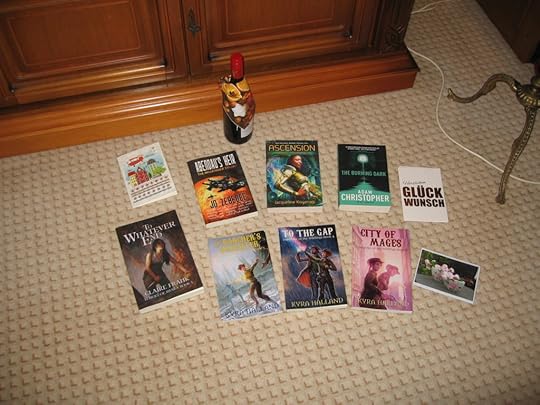
Unwrapped presents: Behold all the lovely books
I’m really happy with that book haul. It’s also notable that except for the Adam Christopher novel, all the books are either small press or self-published. Even if you are primarily a print reader (though I own two e-readers, a Kobo Glo and a Tolino Shine), indie books are becoming a lot easier to come by.
I got a few phonecalls, too (and probably missed a few more due to being away at school), from my aunt, my cousin and a former student.
I also got another phonecall, late tonight, that was not so happy. Because the phone suddenly rang at half past ten. “Huh”, I thought, “That’s rather late for a birthday call.” Though it might have been someone who knows I don’t normally go to bed early.
So I answered the phone and found that it was my aunt, which was odd, because my aunt is a) not the type of person to make late evening calls, and b) she had sent me a card (the one with the pink roses), so I was surprised she called as well.
However, it turned out that the call wasn’t a birthday call at all. Instead, my aunt called me to inform me that my uncle had died that evening. Now this is less tragic than it sounds, because my uncle has been extremely ill for years now. He’s also been close to death several times before, so the news wasn’t entirely unexpected. Nonetheless, I was stunned, especially since I had talked to my cousin earlier that evening with no indication that anything was wrong.
Coincidentally, my uncle happened to die not just on my birthday, but also on the birthday of his mother, my grandmother (I share a birthday with my grandma), and one day before the birthday of his grandson.
 Send to Kindle
Send to Kindle
April 17, 2016
Two New Science Fiction Releases: Lovers’ Lane and Double Feature
I have two new stories to announce today, two stories that are in many ways two sides of the same coin.
Let’s have a bit of background: In November 2013, I published a short story called Acacia Crescent, in which a young boy is saved from a mafia hitman by an unexpected alien invasion (Are there ever expected alien invasions?). Acacia Crescent was supposed to be the first story of The Day the Saucers Came…, a series of first person eye-witness accounts of a B-movie type alien invasion in a alternate 1956. Alas, I never wrote the other stories, so Acacia Crescent remained a standalone. Until now…
For today I present you not one but two new stories of The Day the Saucers Came… Both stories offer not just a glimpse into 1950s small town teenager life, just before it is interrupted by death ray shooting flying saucers, they are also companion pieces, featuring two very different female first person narrators whose stories just happen to overlap.
By the way, if you want to read all three stories of The Day the Saucers Came… together, you can also purchase them for a reduced price as a handy series bundle at DriveThruFiction.
Lovers’ Lane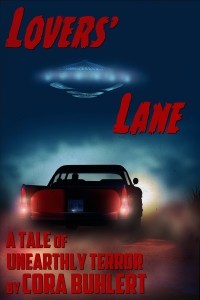 1956. After a sock hop at the local high school gym, teenagers Betty and Cody drive out to Lovers’ Lane together. Betty knows only too well that good girls don’t go to Lovers’ Lane with boys. But Cody is her one true love and besides, he swore that he’d love her forever or may he be struck down where he stands. But then, an alien invasion shows Betty just what Cody’s word is truly worth…
1956. After a sock hop at the local high school gym, teenagers Betty and Cody drive out to Lovers’ Lane together. Betty knows only too well that good girls don’t go to Lovers’ Lane with boys. But Cody is her one true love and besides, he swore that he’d love her forever or may he be struck down where he stands. But then, an alien invasion shows Betty just what Cody’s word is truly worth…
More information.
Length: 6200 words
List price: 0.99 USD, EUR or GBP
Buy it at Amazon US, Amazon UK, Amazon Germany, Amazon France, Amazon Netherlands, Amazon Spain, Amazon Italy, Amazon Canada, Amazon Australia, Amazon Brazil, Amazon Japan, Amazon India, Amazon Mexico, Kobo, Barnes & Noble, Apple iTunes, Scribd, Smashwords, Inktera, txtr, Thalia, Weltbild, Hugendubel, Buecher.de, Libiro, DriveThruFiction, OmniLit/AllRomance e-books, Casa del Libro, Flipkart, e-Sentral, 24symbols and XinXii.
Double Feature 1956: Judy is the designated town slut of Stillwater Creek. After getting thrown out of a sock hop at the local high school, Judy winds up going to the movies with bad boy Hank instead, where a science fiction double feature is playing. However, before the first reel of the second movie is through, the night is interrupted by a very real invasion of flying saucers from outer space…
1956: Judy is the designated town slut of Stillwater Creek. After getting thrown out of a sock hop at the local high school, Judy winds up going to the movies with bad boy Hank instead, where a science fiction double feature is playing. However, before the first reel of the second movie is through, the night is interrupted by a very real invasion of flying saucers from outer space…
This is a novelette of 8500 words or approx. 30 print pages.
More information.
Length: 8500 words.
List price: 2.99 USD, EUR or GBP
Buy it at Amazon US, Amazon UK, Amazon Germany, Amazon France, Amazon Netherlands, Amazon Spain, Amazon Italy, Amazon Canada, Amazon Australia, Amazon Brazil, Amazon Japan, Amazon India, Amazon Mexico, Kobo, Barnes & Noble, Apple iTunes, Scribd, Smashwords, Inktera, txtr, Thalia, Weltbild, Hugendubel, Buecher.de, Libiro, DriveThruFiction, OmniLit/AllRomance e-books, Casa del Libro, Flipkart, e-Sentral, 24symbols and XinXii.
 Send to Kindle
Send to Kindle
April 15, 2016
Photos: Flowers and Sunsets… and Pirates!
Enough politics for today, let’s have some pretty photos.
The mild and sunny weather of the past week has given nature a boost with spring flowers in full bloom all over. So here are some of them. These are all mobile phone shots BTW, hence the quality is a bit lower than usual:

Some kind of violets blooming in the neighbour’s garden.

A medley of springtime flowers, also in the neighbour’s garden. There are forsythias, daffodiles, pansies, primroses and others.

More forsythias blooming over a fence.

Some kind of shrub with bright pink blossoms peeking over a fence.

Forsythias and the pink blossomed shrub peek over the fence.

White tulips and little blue flowers whose English name I do not know in the garden.

Panoramic view of a particularly pretty sunset last week.
Finally, here is not a nature photo. No, this is a group shot of the small crew of five Playmobil pirates as well as one parrot and one monkey who live on my desk. I still hope for a female pirate someday, but though Playmobil makes female pirates, they only come in the big sets, not individually packaged:

The Desk Pirates pose for a group photo.
 Send to Kindle
Send to Kindle
Cora Buhlert's Blog
- Cora Buhlert's profile
- 14 followers


